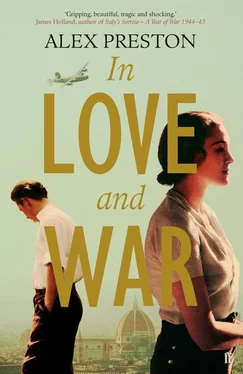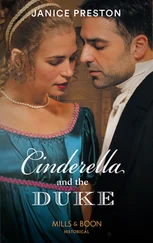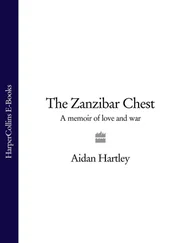At least there’s Christmas. We’ll have masses to catch up on when you’re here. Mother and I went into Chester yesterday and I saw what I want to get you for your present. I won’t spoil the surprise, but it’s just perfect. Can’t wait to sing carols and roast chestnuts and go for walks in the cold and generally just bask in your company.
Excited oodles,
Anna xxx.
Villa dell’Ombrellino
Piazza di Bellosguardo
Firenze
2/12/38
Dear Harold, Frederick and Esmond,
It is with some sadness that I write to tell you that George and I have decided, when we visit Violet in Sussex this Christmas, to stay with her into the New Year. Whether it’s the position of L’Ombrellino, perched up here custodial of the city, or our own status within Anglo-Florentine society, it is impossible for us to remain. Windows broken at night, the crudest graffiti on the walls, two cooks in a row burgling us of food and plate and the police won’t do a thing about it.
We will, of course, be back eventually, whether after this ghastly looming war or before it. George is still certain we’ll be fighting the Russians. He has dusted off his uniform in anticipation and is wandering around looking fairly brutal.
We wanted, before we go, to wish you both a great deal of luck, and to thank you for all the entertainment, friendship and joy you have brought to us these past few years. We’ll be leaving many of our possessions here. I’ll send Massimo down with a key — perhaps you’d pop in and make sure the place isn’t overrun with rats or Italians in our absence.
With love and best wishes,
Alice and George Keppel.
La Palme,
Bast de l’Abbaye,
Le Colle-sur-Loup,
Alpes-Maritimes,
France.
17th December, ’38
Dear Esmond –
Tempus fugit! Know I should have written sooner to thank you for helping with the scrape I got myself into last year. Inexcusable, really, but I’ve been travelling rather a lot. In the hills above Nice now, but got here via Greece, Morocco, Malta and I don’t know where else. Pino has just joined me. His eyes are back working, but he’s grown horribly tubby. Can hardly bear to look at him. We’re working on a book of aphrodisiacal recipes together. Have you ever tried simmered crane? Lambs’ testes? Sow’s vulva? Thought not. All of them dee-lish.
A lot of blathering about the war. Nothing like an expat community to inspire a gaggle of silly women on the subject of catastrophe. Pino and I intend to stay gracefully here for a few more months before returning to Italy. It’s the only place I feel sane, you see. If there is a war, all the better. The prospect of a gruesome death gives young men a bit of spritz. Don’t go into battle yourself, though, Esmond. It’d be a crime to risk that exquisite phiz.
How’s the writing coming along? Are you keeping a diary? You’ll thank yourself when it comes to your autobiog. More than that, reading back over the early years of this century in my own tattered journals is one of the few unassailable pleasures left to me. Affreux being alive at this age, I tell you. Pity in the eyes of the sailors by the dock, with their rotten teeth and the reek of bouillabaisse. Better live in the corridors of your own memory. To do that: keep a diary.
Love to Gerald. Terribly sorry about Fiamma. Rotten luck.
Norman.
His father meets him at the train station at Gobowen. He is standing on the platform as the train pulls in, a silk scarf around his neck. He is obscured briefly by a cloud of steam and then reappears, waving his newspaper. He looks old, kind, eager. The Humber is parked in front of the station. Esmond lifts his bag into the back and climbs up beside his father. It is as if the steam from the train follows them onto the road: mist parts as they motor along the narrow lanes, through Whittington with its castle and ugly red church and up the hill to Welsh Frankton.
His family is waiting at the front door when he arrives: the silhouette of his mother, Rudyard to one side with a dog in his arms, scratching its ear. Anna pushes past her brother and comes running out to the car. Her breath is heavy and hot as she embraces him and he is surprised at his tears. She has lost weight and he lifts her from the ground with ease, pressing their damp cheeks together and spinning on the gravel of the courtyard.
He’s only here for four days — he and Goad will be broadcasting again on New Year’s Eve — but now, surrounded by his family, with Christmas to look forward to, the evidence of his success in the way his father steers him to the drinks cabinet, sits beside him on the sofa in the library, places his hand on Esmond’s as if to assure himself of his son’s physical presence, he feels weightless, joyous, grown.
On Christmas Eve, Mosley and Diana arrive, on their way to Wooton Lodge. Everyone seems to want to touch Esmond, to congratulate him, to hear from him some story of his time in Italy that can be theirs. Diana drinks too much at lunch and then sits very close to him on the sofa afterwards. — Kit is so frightfully chuffed, she whispers. This is what she calls Mosley. — Not just with the money, darling, but with the way you’ve made the British Union seem relevant and involved in the great matters of the Continent. She blows cigarette smoke towards him and laughs. She places a hand on his thigh, moving it in languorous strokes until it brushes the tip of his cock. He feels himself reddening, murmurs an excuse and goes to join Anna and Rudyard in the kitchen.
Mosley grips him by the hand as he leaves. They are all standing in the hallway and he speaks in loud bursts. — Bloody good stuff, Esmond. A man in his father’s image. Knows how to get things done. Make sure you keep it up. We’re all relying on you. Sir Lionel is looking at Esmond with a kind of evangelical glow. His mother comes up behind him and puts a gentle hand on his back. They go out into the courtyard, waving, as Mosley’s car disappears down the drive.
On Christmas morning they sit around the tree in front of the fire. The day seems to serve nostalgia, newly minted. As he watches his mother tousle Rudyard’s hair, his father unwrap his presents using his arm and his teeth, Anna open the purse he’d bought her on the via Calimala, he begins to miss and grieve for them, as if the picture were gently fading before his eyes. A Jack Russell and a Scottish terrier come bounding in, yapping and worrying the wrapping paper until Rudyard follows, chasing them out.
Esmond saves his present from Anna until last of all. It is large and square and carefully wrapped in brown paper. He opens a wooden frame around a collage of photographs of the family. He holds it in his lap, smiling, letting himself drift downwards into the scenes she has laid out for him: his mother and father by a piper at Loch Katrine, Anna and him in front of the beech tree at Aston Magna, Rudyard with blood-stained cheeks standing high in his stirrups. Anna comes to sit beside him — It’s simply ripping, old thing, he says. — Thank you .
He and Anna go for a walk that afternoon. The wind has picked up, shredding the clouds above, letting down barbs of winter sunshine. Three ducks bob on the canal’s glassy back. — How are you? he asks. A faltering of her eyes. — I’m marked for death, she says. Like a character in a motion picture . She laughs and he sees the red-ribbed roof of her mouth. They walk past glumly chewing horses, a pub with smoke drifting from its chimney, the slim elegance of a birch wood. — I live through you, she says. It’s not as sad as it sounds. Each of your letters, it’s like a clear breath. Keep writing them . They stop there and the wind leans into them. She shudders. — I love you , he says, and he realises it’s the truest thing he’s said, perhaps ever. They walk back in silence, arms linked.
Читать дальше












